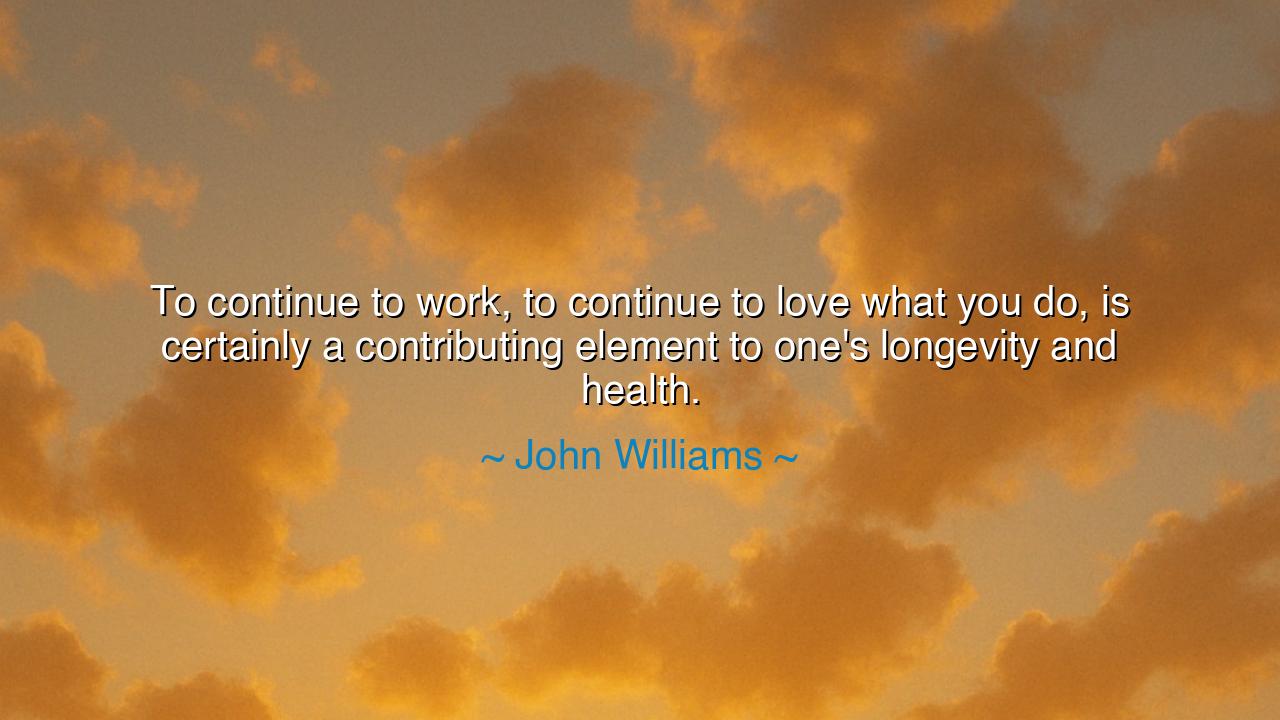
To continue to work, to continue to love what you do, is
To continue to work, to continue to love what you do, is certainly a contributing element to one's longevity and health.






In the words of John Williams, the master composer whose music has stirred the hearts of millions, there resounds a truth as timeless as melody itself: “To continue to work, to continue to love what you do, is certainly a contributing element to one’s longevity and health.” These words flow not merely from intellect but from the wellspring of experience—from a man who, even in the later seasons of life, continues to create with the vigor of youth. His message, like his music, is harmonious and profound: that purpose and passion are the twin guardians of vitality, and that to love one’s labor is to give life its rhythm and the soul its light.
The origin of this wisdom lies in the ancient understanding that life’s strength is sustained by meaning. The sages of old knew that the body, when guided by a devoted spirit, endures beyond what reason might predict. The philosopher Seneca wrote that to live long is not to live many years, but to live deeply, and that idleness dulls both mind and flesh. John Williams, in his modern voice, reminds us of the same truth—that it is not rest that preserves us, but engagement; not luxury, but love for the work of our hands. To labor with joy is to keep the flame of being alive, bright, and steady against the winds of time.
Consider the story of Michelangelo Buonarroti, who, in his ninetieth year, still carved marble with trembling hands and fiery heart. His body was frail, but his spirit burned with the same creative fervor that shaped the Pietà and the Sistine Chapel ceiling. When asked why he continued to work despite his age and pain, he replied, “Ancora imparo”—“I am still learning.” In that phrase lies the secret John Williams reveals: that to work in love is not a burden but a blessing, not an act of duty but an act of life itself. For the human soul withers not from labor, but from the absence of purpose.
To love what you do is to align yourself with the pulse of creation. Every craftsman, teacher, musician, or healer who pours heart into their art joins in the great rhythm of the universe. In that devotion, the years do not drain but renew, for joy is the elixir that strengthens the body and clears the mind. Science now affirms what philosophy and faith have always whispered: that passion releases the forces of health, while apathy corrodes the spirit. Longevity, then, is not merely a gift of genetics—it is the reward of a soul in motion, a mind alive with curiosity, and a heart that beats for its calling.
Williams himself, well into his nineties, continues to compose with grace and vitality, his baton a symbol of unbroken purpose. The symphonies of his life are proof that work and love are not enemies of rest, but the source of it—that when one’s heart is engaged, every note, every act, every breath becomes an offering to the divine harmony of existence. His quote reminds us that the secret of endurance is not found in escape, but in continuity—in returning each day to the craft that nourishes the spirit.
Yet this teaching is not reserved for artists alone. Whatever one’s path—be it building, teaching, nurturing, or healing—the same law applies. When we turn our work into worship, when we labor not from compulsion but from affection, life itself becomes a song. Those who work without love grow weary, but those who work in love grow strong. Even in difficulty, such a life brings meaning that no luxury can replace. For in loving our labor, we affirm our belonging to the grand design of creation.
The lesson, then, is clear and eternal: do not retire from purpose, for purpose is the breath of the soul. Whether young or old, seek always to do what awakens your spirit. Let your work be an expression of gratitude for life itself. When you find that which makes your heart sing, guard it, nurture it, and continue it, for it will keep you alive far beyond your years. As the ancients said, “The man who loves his work never truly grows old.”
So, remember the teaching of John Williams—to continue to work, and to continue to love what you do—for in that love lies the secret art of longevity. Do not chase immortality through fear of death, but through devotion to life. Pour your heart into what you create, and your spirit shall never decay. For those who live in love with their labor are like the music Williams gives to the world—ever enduring, ever alive, echoing long after the final note has been played.






AAdministratorAdministrator
Welcome, honored guests. Please leave a comment, we will respond soon